44 Sustainable travel tips: look after the planet
Responsible travel is not just a trend. It’s a way of life. Yet it can be outright confusing to know where to start. Luckily, we’re here to help. These sustainable travel tips will help you tread lightly, as you explore your way around our beautiful planet.
![A sign in Western Australia. It reads: 'Western Australia, too lovely to litter. Shoot only with your [camera icon]. Take only your [rubbish icon].Leave only your [footprints icon].' Use these sustainable travel tips to follow these directives.](https://photos.smugmug.com/Watermarked-Pics/i-wpBC89P/0/15ae95e9/M/wa-litter-sign-M.jpg)
Should you only stay in eco-friendly lodgings? Is flying no longer an option? Should you worry about whether what you’re eating is considerable to be sustainable?
Is it right to boycott countries that don’t have adequate responsible tourism policies?
I know these are all questions I’ve asked myself, as I’ve travelled around the world.
Beyond that, it can seem like eco-travel is an off shot of luxury travel and way beyond the price range of what you can afford. While you would love to stay in that tree-house in a remote Costa Rican jungle, your bank balance says you will be choosing otherwise.
It’s a matter of taking conscience steps towards doing the right thing. And doing so with a bit of a sense of humour about the whole thing.
I’ve compiled a list of sustainable travel tips, essentially everything I’ve learned while travelling around my home country of Australia and the world.
You might also want to check out this guide to travelling zero waste.
Simple sustainable travel tips
Here are some responsible travel tips that will help you look after the planet. They also may even you save some cash!
1. Invest in quality travel items that are going to last
The key thing I have been doing since I started living a more sustainable lifestyle is investing in good quality items that will stand the test of time, rather than crappy junk that’s going to break.
Many of these items save me from having to rely on disposable utensils when travelling as well.
At the very least, I am sure to bring:
- water bottle. (See some other options here
- spork
- KeepCup (shop in Australia)
- reusable shopping bag
- cloth bags
Here’s a complete and detailed list of eco-friendly items you can take travelling.

2. Be organised in your packing
Similarly, don’t leave your packing until the last minute. Think carefully about what you’re going to need on your trip.
Make a list. Do as Santa does and check it twice.
Pack everything carefully, at least a day before you leave.
Ask yourself – do you have all your toiletries?
Have you packed the right sort of clothes?
Did you remember to bring your insect repellent or any meds you may need?
This will stop you from arriving in your destination and immediately smacking your forehead because you managed to leave your toothbrush in your bathroom. You won’t have to spend the time or money having to hunt down a new one.
Here’s an eco-friendly packing list you can refer to in your packing.
3. Read up ahead on what kind of clothes you’ll need
Do some research before you leave and use the wardrobe you already have to adapt.
Is the place windy or rainy? You’ll know now and be able to pack your raincoat, umbrella or scarf.
Are there certain religious rules you’ll need to respect? Good to know and you’ll have long-skirts or trousers and a shawl handy for the occasion.
4. Make use of what you already have
Don’t buy new clothes just for travelling.
I used to treat any trip I took abroad as an excuse to go shopping for new threads.
This was just silly and pointless. I already had plenty of clothes lying around my wardrobe, some of which had barely seen the light of day.
When you’re packing for travel, don’t be afraid to take the outfits that you’d wear on any other given day.
You’ll be far more comfortable in them, anyway.
5. Borrow what you don’t have
Is there a certain item you need, but you don’t think you’ll get much use out of?
Don’t worry about buying it – borrow it, instead!
Ring around some family members, text friends, put a plea out on your socials.
Most people are kind and will lend you what you need (granted you take care of it and they’re not needing to use it themselves!).
Although borrowing something means you are getting it for free, I would always advise spending a few quid on a box of chocolates or a nice bottle of vino in return, to thank the person for their help.

6. Shop secondhand for what you need
If there is something in particular you do need for your travels, chances are, someone else is trying to get rid of the exact same thing.
Going on a camping trip and need a tent? Gumtree and Facebook Marketplace are my go to for scouting secondhand items in Australia.
Craigslist or Freecycle are good options for those living elsewhere.
Do make sure you either met the person in a public area, bring someone with you or let someone know where you’re going. Safety first.
Don’t discount op/charity shops either. I’ve found some gems while scouting my local St Vincent de Pauls. I swear sometimes the exact thing I’m after manifests right in front of me.
Markets are also a good bet for sourcing goods, alongside car boot sales – and keep your eye out for garage sales, too!
One (wo)man’s trash is another (wo)man’s treasure, after all.
7. Travel by train, ferry, bus, bike – rather than flying
‘They’ say it’s the journey, not the destination that counts.
And ain’t that the truth of it when you opt to travel really any other way rather than by plane?
Sometimes flying is the only option. I understand this as an Australian living in the bottom end of the world.
However, there are often better methods of travelling. You can take a ferry, or jump on a train. Save money on or bus. Or even turn your travels into a multi-day hike or bike ride.
Hell, even horse back can sometimes be an acceptable mode of transport. This does bring me to my next point…
8. Avoid animal tourism
There really is no excuse now for partaking in the wrong kind of animal tourism.
Elephants? Don’t ride them. Shady zoos? Don’t visit them, rather stick to those that actively participate in animals conservation.
And Tinder has shown just how awful those photos of you with a stoned tiger make you look.
If you’re mingling with animals on your trip, do your research and avoid any suspect interactions.
Let the wild be wild.
9. … & voluntourism
Likewise, many voluntourism can have negative effects on local communities. This is because they often host people who have little or even no experience in the work they’re tasked with.
It’s often not cheap either. Volunteers see themselves having to pay for flights, transfers, food, travel insurance, visas and sometimes even their accommodation. Plus companies can charge volunteer fees.
Some volunteer projects are just simply not needed. It doesn’t mean you can’t volunteer – you just need to be discerning of the project’s long term impacts on the local community or area.

10. Travel with eco-friendly travel companies
Going on an extended organised trip? Choose a tour operator who go above and beyond.
You could take a large multi-day trip with a company like G Adventures or Intrepid.
Or look for smaller operators, offering up positive environmental experiences.
Here’s a list of B Corp certified travel agencies to get you started.
11. Observe local customs
When you’re travelling, remember you’re a guest in someone else’s country. It’s polite to follow the local customs, as a sign of respect.
Dress appropriately for the culture and try to learn a little bit of the local language.
If you’re staying within a local neighbourhood, don’t party on into the night and disturb people.
A little respect goes a long way!
12. Bring your own filtered water bottle
In some cases, you can drink water straight from the tap, with a little assistance from a filtration device.
My go-to is my GRAYL water bottle (see a full review ).
Obviously play it by ear and don’t jeopardise your health.
But if a country has perfectly safe drinking water, why would you waste your hard-earned money on bottled ones?
13. Say no to straws
One of the most simple sustainable travel tips on this list and an easy way to save on plastic, without it costing you a cent.
Next time you order a drink, ask for no straws.
I’ve had the most success where I’ve outright asked people if they put straws in their drinks – they have to think about it and answer and then usually seem to remember that I don’t want one when they place the order.
It does seem as time has gone on, a lot of places are banning straws or opting for reusables.
Discover how to avoid straws if you don’t speak the language.

14. Take nothing and leave nothing behind – revised
I agree with the sentiment that you should enjoy a place just as it is and be sure to leave nothing behind.
As for taking nothing – well, I have a bit of an issue with that.
There is because there is something you should always take with you when you see it.
I’m talking about rubbish.
Trash. Litter. Whatever you want to call it, it’s gross and damaging.
If you’re somewhere that has a bit of litter lying around, you can help out by collecting it to throw in the next bin you find.
I particularly like to do this whenever I’m near a beach.
Beaches are beautiful and should be kept this way and better to pick it up than have it wash out into the already polluted ocean.
15. Organise your own clean ups while exploring areas
In fact, one of my favourite activities when travelling now is to spend a bit of time picking up litter.
I use a reusable cloth bag, or if I’ve accidentally been saddled with a plastic bag at some point (or find one drifting around), it’s what I use to collect rubbish.
It’s a nice way of saying thanks to a destination and giving back something in return.
16. Explore your own backyard
This is my top sustainable travel tip.
Who says you have to go overseas to travel?
Sometimes exploring your own backyard can be the most rewarding thing to do.
I live in Australia and spend a lot of time travelling around my own country, my state of Victoria or even just exploring parts of Melbourne, where I live.
I enjoy it just as much, if not more than travelling overseas.
And it costs a lot less, especially if I’m just heading somewhere for the day, or travelling to another city where friends live.
17. Shop locally
I don’t think there’s any harm in buying souvenirs – they’re a fun way of remembering your travels.
It doesn’t hurt to be a little bit discerning of where you buy them from.
Do they look like they’re made locally (jewellery can often be good for this)? Or are they cheap junk made in another country like China?
Markets are a good place for this, where you can support local businesses and spread the tourist dollar around to where it’s needed.
If haggling is part of the practice there, don’t be afraid to get in and give it a go!
Make sure you walk away with a price that’s fair on both parties.

18. & eat locally
Likewise, look for small hole-in-the-wall places to eat your food (although be careful if you have a sensitive stomach – you don’t want to get sick!).
Popular restaurants can be fun, but the food I tend to dream of from my travels are often off the street, or in markets. The low prices of some of these dishes is utterly staggering.
19. Or cook in your accommodation if you can
There’s benefits to staying in self-contained accommodation, or within hostels.
You can cook your own meals, often using local produce to enhance the flavours.
As part of your travel experience, you may want to take a local cooking class, then try recreating the meal before you head home.
This is both memorable and also can help you save money on your trip.
And if you’re staying in shared accommodation like a hostel, you can always also share your meal.
20. Travel slowly
This is admittedly a bit of a hard lesson to learn, being someone who is used to rushing around and trying to fit everything in.
Don’t try to do too much when you travel.
Plan activities yes, but give yourself lazy days where you can just walk around, chill in cafes, heck, even read in your hotel if that’s what you need.
You’ll end up spending less money, but enjoying other activies a lot more.
21. Don’t accept maps at attractions if you don’t need them
Another simple sustainable trip where all you have to do is say no.
Lots of places have maps ready for visitors to utilise, which are handy, but not always necessary.
Don’t just thoughtlessly accept it, have a good think about whether you really need it.
If it is something you reckon you’ll need, you could just use your phone! Snap a picture of it and refer to when necessary.

22. Or give them a second life for someone else to use them
If you have used a map that’s been given to you at a hostel, hotel or attraction, pop it back at the front desk when you’re done, so long as it’s in good condition.
23. Research public transport rather than using taxis & ride shares
Public transport is ridiculously cheap in some countries and it’s worth researching whether it’s an option you can use.
As always, safety first. In some countries, I watch to see if the local women are taking the public transport. If they’re not – I don’t either.
24. Or just walk & cycle to get around
If the distance isn’t far and the weather is fine or at least bearable, why not forgo public transport entirely?
Hire a bike for a two-wheeled adventure or just head out on foot, if it’s safe to do so.
25. If you menstruate, use a cup or reusable cloths
This is a simple responsible travel tip that can save you hundreds of dollars.
I’ve had a Lunette Menstrual Cup for four years now and absolutely adore it.
I estimate it’s saved me over $1000 AUD during this period of time. Not an amount to scoff at.
I use the cup in conjunction with Gladrags reusable cloth pads, which are easily washable and come in a range of colours and sizes.
Read more about keeping your period eco-friendly.
26. Do your own laundry, rather than going to laundrettes
If you’re on the road for awhile, you could really go through the dollars as you try to keep your clothes clean.
I use a Scrubba and soap berries to get my washing done when I’m travelling for awhile.
I also tend to stay with friends and stretch my laundry so that I can utilise their washing machine.
27. Housesit
House-sitting is an easy way to prolong your travels and save on money in the same instance, as you don’t have to pay for accommodation.
Many places ask that you look after their pets while they’re away, which means you have a bonus of a furry companion to while away lazy hours with.

28. Camp or glamp when you can
Craving some time with nature, keen to save on cash or both?
Camping is one of the most sustainable ways to travel. You tend to reuse equipment (or can share with family and friends), you’re in nature and the overall carbon footprint is low, so long as you take all your rubbish when you leave.
Make sure you camp only in dedicated sites, unless you’re in a country with clear right to roam laws.
Glamping is the higher end version of camping, so a little bit more expensive.
On the upside, everything tends to be provided for you. And, most sites are low impact or operate within a closed loop.
I’ve often based entire trips off a ‘glampsite’, Here’s a little bit of inspiration.
29. Stay in green certified accommodation
If you’re not keen on camping or glamping, give your hard earned money to businesses who are doing their best to follow sustainable practices.
A quick look on line can usually be enough to establish a hotel, motel or hostel’s green credentials. Many will proudly display their certification on their websites.
You can also choose to only book sustainable hotels when using an service such as Booking.com.
You’ll find anything from basic accommodation to high-end five star hotels – so there’s an option to suit all travellers.
30. Make use of the ‘Do not disturb’ sign
Let’s be honest. Most of us don’t need our rooms cleaned every night, or new laundry daily.
Cut down on labour and washing with the simple hack of hanging the ‘do not disturb’ sign on your door.
31. Or even just hang up your towels!
Some hotels will only take towels that have clearly been used for a few days.
So, leaving your towel hanging up in the bathroom is an indication that it needs to be cleaned.
In general, when you’re departing a hotel, don’t leave your towels on the floor. Think of the cleaning staff’s backs and put them in a place where they don’t have to bend over to grab them.
32. Avoid hotel toiletries
Many hotels still offer up small toiletries that you usually end up using once or twice then discarding.
So wasteful!
Bring your own hand soap, shampoo and conditioner.
If you do end up using the toiletries, take them with you, to use at home.
I have a couple of old hotel bottles that I refill and keep in the locker at my gym. It means I can shampoo my hair after swimming.
33. Turn off all electrics when you leave your accommodation
Likewise, turn off anything you’re not using from the electrical switch, when you leave your accommodation, or even if you’re just not using it.
Kettle, toaster, television, light switches. Even on standby, these can needlessly drain power.

34. Leave the drone at home
You’re in the great outdoors taking in a seaside/mountain view.
It’s gorgeous. Peaceful. The air is still. You can hear birds singing.
The suddenly… BZZZZZZZZZ
In flies a drone, completely ruining the atmosphere and disturbing every living thing in the immediate vicinity.
This is my pet hate when travelling.
Drones are illegal to use in many places, such as cities and national parks. For good reason.
Don’t be that person. Take mental pictures, or snap a quiet shot on your camera and phone.
35. Don’t bring in unwanted visitors via your boots
A consideration when hiking from place to place – unwelcome travellers may hitch a ride on your boots and create havoc at your next destination.
If you’ve been in heavy forests or bushland during your travels, give your boots a bit of a clean before heading home, or moving on to your next destination.
36. Go vego or vegan
While not everyone can go vegetarian or vegan (food allergies come to mind), we all could probably benefit from eating less meat.
You could choose to cut down on or cut out animal products on your travels. It’ll probably be better for your pocket!
Alternatively, I also advocate eating parts of the animal that would normally go to waste.
Many countries are better at doing this than some wasteful Western places are.
For example, I ate a sheep’s head in Icelandd… and I liked it!
37. Avoid places suffering from overtourism
Some destinations have become so popular, that they’re actually suffering from the amount of tourism they receive.
Consider the crowds in front of the Mona Lisa and the Louvre in Paris.
People clambering over the rooftops of private property in Santorini.
The flood of people into popular American National Parks.
I remember when I lived in London and used to go jogging up the Thames. I was slowed down by slow moving tourists and ran a real risk of getting poked in the eye by a selfie stick.
And more examples, worldwide.
There’s a real pleasure in wandering off the beaten path, rather than ticking off the sights you feel you have to see.
Less crowds. Not so hostile locals. Better experiences.
38. Don’t use AirBnb in cities
Driving up rent. Disturbing the peace. Taking valuable housing options away from locals.
The fact that AirBnb causing many issues for locals is pretty well documented. In fact, some places such as Barcelona, Paris and Berlin have enacted laws to cap holiday rentals and manage long-term supply of housing for locals.
You don’t have to completely give up the option of experiencing a destination through a local lens, if you choose not to use AirBnb.
Consider using a platform like Fairbnb, which only allows owners to list a single property and donates half of their proceeds to community projects.
Here are some other issues from using AirBnb that you may not know.

39. Fly with airlines using renewable biofuels
While I don’t think shaming people for flying is necessarily helpful, there are methods you can take to ensure your journeys are more sustainable.
Biofuels are taking off and some airlines are giving it a flying chance.
Virgin Australia, British Airways, Lufthansa, KLM and United Airlines are some of the airlines using biofuels on their commercial flights.
Made from plants, trees, algae and waste, these fuels are a great opportunity for the airline industry to reduce emissions in the short term.
So do your bit and support the airlines determined to soar to new heights.
40. Don’t fly first or business class
It’s admittedly a luxury that many of us can’t afford, but maybe it’s for the best.
The more people you can fit on a flight, the more sustainable the flight is.
Business and first class areas of course contain less bodies, so they’re a bit of a drag on resources.
Trust me, I’m well versed with the discomfort of a long-haul flight (I am Australian). But this is best avoided if you can.
41. Avoid needless stopovers
Similarly, avoid taking flights with a bunch of stopovers. It’s far more efficient to fly direct if possible, or limit your trip to one stopover.
Although these sort of flights can be cheaper, ask yourself – what’s more valuable? Time, or money?
Money can come and go. Time, you never get back.
42. Hire hybrids or electric cars if you can
As infrastructure for these methods of transport expand and fuel prices skyrocket, there’s plenty of arguments for hiring a hybrid or electric car the next time you hit the road.
It’s important to point out that EVs aren’t perfect. The electricity has to come from somewhere (and is often powered by fossil fuels), along with the materials used within the batteries.
I’m also a little creeped out by how quiet they are!
However, they don’t emit CO2 or other toxic gases that pollute the atmosphere.
Check Rentalcars.com for prices for your next road trip.
43. Stick to marked trails and paths
Tramping, walking or hiking?
If there’s a marked trail, please try and stick to it.
By wandering off trail, you can disturb local wildlife or accidentally squash rare or endangered plant life.
Sticking to the dedicated trails will prevent this.

44. Don’t visit a destination just because Instagram says so
Probably the biggest travel-related environmental issue of our time!
Travel somewhere because you want to. And not because you just want to take a pretty picture that you saw on Instagram.
Especially if this place is somewhere not open to the public. Or you have to wander off a track and squash local flora to get there.
And most baffling, you have to line up to get the shot you’re after. Its bananas behaviour!
Travelling for Instagram is superficial. Go deeper on your adventures and connect with this wild world of ours.
So there you have it. Really easy sustainable travel tips to get you started on your journey. Have any more to add to this list? Holla at me in the comments.
Did you find yourself nodding along as you read this post? Please pin away. 📌


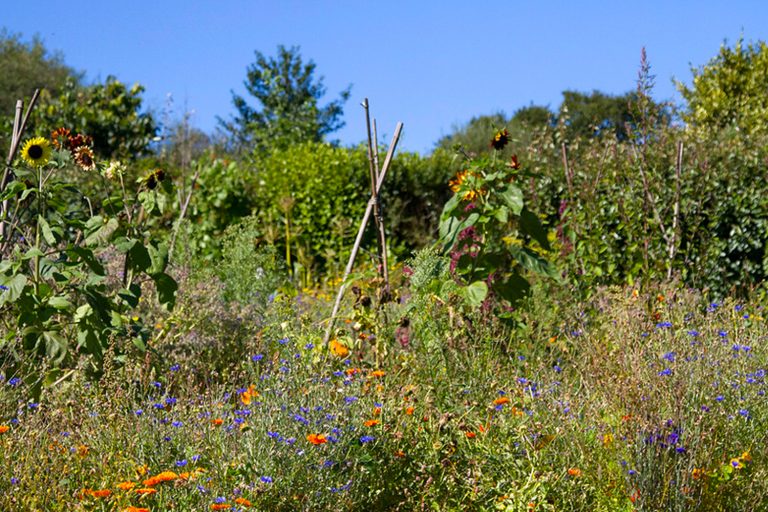

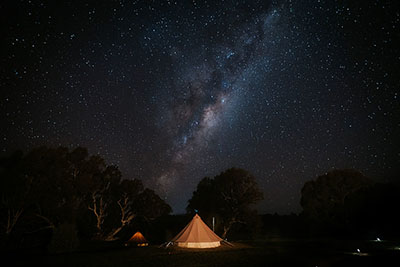
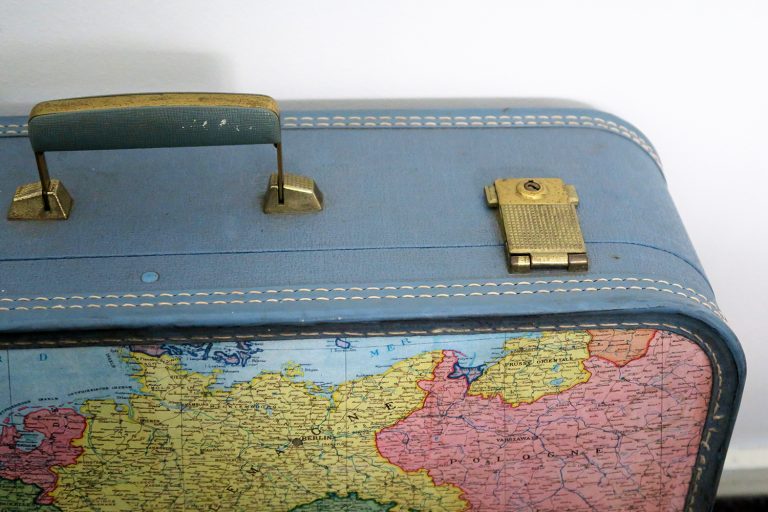
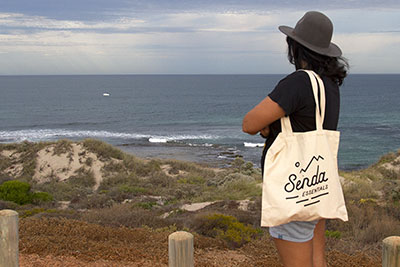
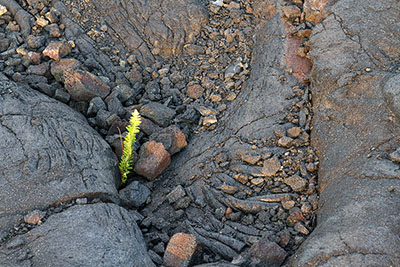
A am a big fan of Eco friend,y travel, as you couldn’t travel without a sustainable planet!
Very true!
I would add: find out if your holiday destination has local markets and shop there. They usually use less plastic and you’re buying local goods. Win win 🙂
Absolute win win!
As far as Craig’s list goes in the UK I hear it’s as dodgy as gumtree, but with a much lower population. I’ve heard excellent things about freecycle though you don’t get to be quite so choosey as everything is free, but on the upside, everything is free!
I forgot about Freecycle actually, thanks for the tip. Will add it in.
Great advice. It really is not hard to cut costs and be responsible if you really put your mind to it. Love that you cleaned up that beach, some people are so rude. It is hard to believe that in this day and age with all the education and knowledge you would like to think people have that there are still so many that litter. Is it really that difficult to pack out what you packed in? Especially when there are trash bins close by.
Sorry it is a sore subect for me, I hate litter.
Well thank you for the great advice, keep on posting great stuff.
The Broke Dad
No need to apologise! I love your enthusiasm on the matter. And obviously feel similarly – nothing makes me madder than litterbugs! It’s lazy, thoughtless and just generally rude to both the earth and all its other inhabitants, human or otherwise.
We still do not understand why individuals think it is acceptable to litter, it makes us mad too. Simple social skills go a long way and this great post highlights this. Thanks for sharing.
Oh, it makes me see red! Thanks for commenting.
Great tips Laura. Responsible and sustainable travel are need of the hour. It is quite remarkable how minor changes in the way we travel and pack can do a great deal when it comes to being responsible and sustainable.
Thanks Sindhu. I agree, it doesn’t take much to make a difference!
You so rightly said that responsible tourism is a way of life, nothing out of the league. It’s what you practice, small small things, that matter and bring the change. Some very useful advice you have given here. We also try to do the same on our travel
These are such great tips! Definitely going to keep these in mind for my future travels!
Thanks, hope they helped.
These days it is so important you don’t leave any trace behind, like plastic bottles, rubbish etc. I love the idea of shopping second hand, you can get some real bargains there! Pinning this for future reference, thanks so much!
No worries, glad it was helpful.
This is truly a useful article. Great tips on responsible traveling. Have always disliked leaving litter behind.
Thanks David. There really is no need to, so much of the time, as well!
Nice description of how to save money while traveling. Some of the great tips to note down. Really very impressive and very interesting. This is truly a useful article. Nowadays it is very important for us not to leave any trash behind, like plastic bottles, rubbish etc. Anyways, I Really Liked your blog. Thank you for sharing such a great post. Keep Posting
Now, I got what I miss the most during my budget travel. Thanks, LC for the awesome actionable tips and indeed its help’s a lot.
I’m glad to hear it!